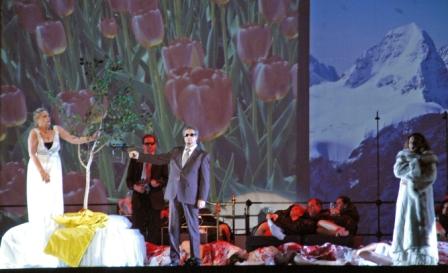|
<<< << -- 5 -- Roderic Dunnett A NEW FASCISM

Adam Fischer, respected worldwide for his orchestral command in repertoire from Haydn and Bach to Ligeti and Eötvös -- he is Music Director not only of the Hungarian RSO and Austro-Hungarian Symphony Orchestra and Internationale Haydntage (Haydn Festival) at the Esterházy Palace in Eisenstadt, but was previously conductor of the Musikalische Akademie des National-Theater Orkester in Mannheim and remains Chief Conductor of the Danish Radio Sinfonietta -- was appointed Music Director of the Hungarian State Opera House in 2007. His appointment was largely behind Balázs Kovalik's decision to assume the Artistic Director's role at the Hungarian State Opera. 'I was offered this job several times and turned it down. But when Adam Fischer was appointed Music Director of the Opera House I felt he belonged to the same European culture as I was, he is steeped in the same international traditions as I am. I felt that finally I wouldn't have to spend my time patiently explaining to people that in Holland the trams are blue, whereas in Vienna they are red. Now I'd have somebody I could speak to, who speaks same language.' Kovalik has long wanted to stage Handel, but been stymied by an artistically indifferent management. Now perhaps his long-cherished staging of Xerxes may at last find its rightful place.

Adam Fischer
|
When, in Kovalik's steamy Elektra, Béla Perencz's Orestes finally turns up -- he whom she had only known as a child of a few years -- he's a sinister, slinky figure in a suit and dark glasses. Why neutralise him thus? 'Because, like her, we don't know if it is really Orestes or not. She hasn't seen him since he was three. Our take on this is that to him, they're all a threat: Aegisthus blocks his way to the throne, Chrysothemis stands for accommodation and compromise, Elektra makes no concessions at all.' Hence the stark -- and arguably gratuitious -- feeling to this production. Orestes and Pylades produce Kalashnikovs and open fire on everyone. It's a Homeric conclusion -- a bit like Ulysses' return -- but the sheer cycnicism of it surely registers in a country where a right wing regime and then the Communist party used ruthlessness and pious deception for sixty years to hold the population down. This brave new era is no dawn of hope, but the brusque advent of a new Fascism.

The bloody dénouement of Balázs Kovalik's Budapest 'Elektra', with Elektra (Nadine Secunde), Orestes (Béla Perencz) and Chrysothemis (Eva Bátori). Photo © 2007 Vera Éder
|
Copyright © 13 March 2008
Roderic Dunnett, Coventry UK

Balázs Kovalik's new production of Eugene Onegin opens at the Hungarian State Opera on 31 May 2008. Next season he will direct Fidelio (from 5 October 2008) and Handel's Xerxes (première 30 April 2009). |
'THE TURN OF THE SCREW' AT HUNGARIAN STATE OPERA
STRAUSS'S 'ELEKTRA' IN CLEVELAND
ADAM FISCHER AND THE AUSTRO-HUNGARIAN HAYDN ORCHESTRA
|

